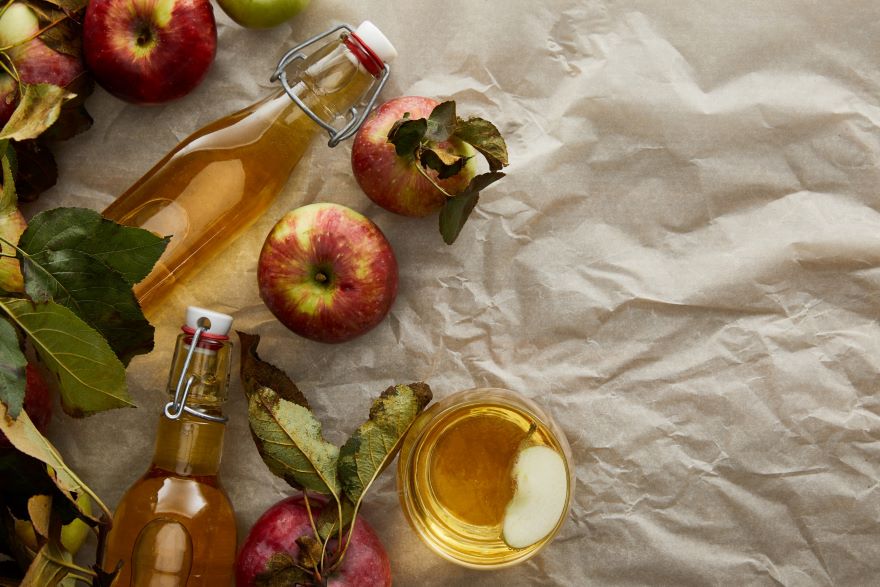People know cider vinegar and apple vinegar as two popular types of vinegar with distinct taste and countless health benefits. Confusion exists over whether they are the same or different. To clear up the confusion, it is essential to consider their production process, flavor profiles, and nutritional values.
People can make vinegar with cider from various fruits initially, while they make apple vinegar specifically from apples. Both these vinegars undergo similar fermentation processes, but their flavors and end results may vary depending on the fruit used.
Knowing vinegar differences helps in shopping and choosing for recipes and health. Examining production, nutrition, and flavor can reveal if they’re the same or different.
Key Takeaways
- People can make cider vinegar from various fruits, while they make apple vinegar specifically from apples.
- Both types of vinegar undergo similar fermentation processes, but their flavors may vary depending on the fruit used.
- Understanding their differences can help make informed choices for cooking and health purposes.

Cider Vinegar vs Apple Cider Vinegar: Defining the Difference
The source material used for fermentation distinguishes the difference between the vinegars. Apple vinegar, as the name suggests, specifically originates from apples. On the other hand, cider vinegar utilizes juices from respective fruits for its production.
I found that the processing methods for both vinegar made with cider, and apple vinegar are quite similar. They both involve extracting juice from fresh fruit and adding bacteria and yeast to convert it into alcohol. However, there’s a noteworthy difference in taste and appearance. Apple vinegar possesses a slightly sweeter taste and a brown hue due to its apple base.
Both vinegars have various uses in cooking, cleaning, and health. Apple vinegar is popular for health, but cider vinegar has uses depending on fruit base.
Cider vinegar and apple vinegar differ due to the source material used for fermentation. They share similarities in processes, but the specific fruit base gives each vinegar unique characteristics in taste and appearance. Each vinegar has unique benefits and uses, so choose based on preference.
How They’re Made: A Look at the Fermentation Process
As I researched the process of making cider vinegar and apple vinegar, I found out that both undergo fermentation. However, they slightly differ in the specific steps within the fermentation process.
First, let’s examine how apple vinegar is made. It all begins with apple juice, typically produced by crushing apples and extracting the liquid. To initiate the fermentation process, yeasts are added to the apple juice. Yeasts convert juice sugars into alcohol, creating hard cider through alcoholic fermentation. If the juice is left open, it can occur without intervention, and the process takes about two weeks.
Next, acetic acid bacteria are introduced to the hard apple cider. These bacteria, which make up the “vinegar mother,” are responsible for converting the ethanol (alcohol) into acetic acid (vinegar). This stage is called acetic acid fermentation and it requires an aerobic environment. The result is apple vinegar, which has a distinctive tangy flavor and numerous health benefits.
On the other hand, cider vinegar is made using a similar process, but the starting material can vary. Instead of just apple juice, it may also include other fruit juices or a combination of various fruits. As with apple vinegar, the fermentation process involves two stages: alcoholic fermentation and acetic acid fermentation. The primary difference lies in the specific flavors, reflective of the fruits used in the starting material.
The main difference between apple and cider vinegar is the fruit content used in production. This ultimately impacts the taste and potential health benefits associated with each type of vinegar.
Flavor Profile: Tangy or Sweet?
When it comes to flavor, cider vinegar and apple vinegar each offer a unique taste experience. Cider vinegar has a tangier flavor that adds an extra kick to dishes. Cider vinegar has a more pronounced tangy taste than apple vinegar’s milder acidity and subtle apple flavor. The fruity undertone in apple vinegar can make it more desirable for those who prefer a slightly sweeter vinegar.
That said, it’s worth noting that cider vinegars can be made from a variety of fruits, so their flavor profiles may differ depending on the source. For instance, raspberry cider vinegar is tangier and fruitier, while strawberry cider vinegar has a more delicate and sweet taste. Each fruit-based cider vinegar brings its own unique set of flavors, making them ideal for various culinary uses.
In general, tangy vinegars like cider vinegar are excellent for adding acidity to dressings, marinades, and sauces, or mixing with olive oil to create a refreshing vinaigrette. On the other hand, apple vinegar with its milder flavor and fruity undertone can work in similar applications, but it shines when used in recipes that call for a slight touch of sweetness, like chutneys or glazes.
To sum it up, the flavor profile of cider vinegar is predominantly tangy, with some varieties offering fruity notes as well. In comparison, apple vinegar leans towards a milder acidity with a characteristic apple taste. Both types of vinegar are versatile and can enhance your dishes depending on the desired flavor outcome.
Nutritional Comparison
When it comes to the nutritional value of these vinegars, there are some similarities and differences to consider. Both vinegars contain trace amounts of minerals, such as potassium and calcium. In terms of caloric content, a 1 tablespoon serving of apple vinegar contains no calories, proteins, fats, carbs, or sodium. Other types of cider vinegar made from fruits, like raspberry cider vinegar, may have slightly different nutritional compositions, but the overall differences are generally minimal.
It’s worth noting that some brands of vinegar add extra ingredients, like sweetening syrup, starch, and flavoring, which can affect the nutritional value. In these instances, it’s essential to review the specific product label to determine the exact nutritional content.
When incorporating cider vinegar or apple vinegar into your diet, it’s crucial to remember that consuming them in moderation is essential. Consuming these vinegars in high amounts could have negative impacts on your health, like tooth enamel erosion or potential digestive issues.
In conclusion, while cider vinegar and apple vinegar have similar nutritional values, various factors may affect their nutritional content, such as added ingredients or the type of fruit used in production. By being mindful of the products you purchase and consuming them in moderation, you can incorporate these vinegars into your diet while maximizing their potential benefits.
Health Benefits and Uses
As someone who has researched the topic, I have found that cider vinegar and apple vinegar share many similar health benefits. They can both potentially aid in weight loss, digestion, diabetes management, cholesterol regulation, and blood pressure control.
One of the main health benefits of cider vinegar and apple vinegar is their ability to help with weight loss. When used in moderation, they may help to increase feelings of fullness, leading to a reduction in overall calorie intake. Additionally, both vinegars have been known to improve digestion by promoting the growth of healthy bacteria in the gut and helping with nutrient absorption.
When it comes to diabetes management, I have learned that cider vinegar and apple vinegar may assist in regulating blood sugar levels. They do this by slowing down the absorption of carbohydrates and increasing insulin sensitivity. This can help prevent sudden blood sugar spikes, making it easier for those with diabetes to maintain a stable blood sugar level.
Cider vinegar and apple vinegar may also play a role in managing cholesterol levels. It is believed that both vinegars can help lower LDL (bad) cholesterol while increasing HDL (good) cholesterol. This, in turn, can potentially reduce the risk of heart disease.
Another health benefit I have found is that both cider vinegar and apple vinegar may help lower blood pressure by relaxing blood vessels and promoting better blood flow. This can, over time, lead to a decrease in high blood pressure.
Lastly, while not strictly related to the internal health benefits, apple vinegar has been shown to soothe sunburn when applied topically to the skin. Its natural anti-inflammatory properties can help reduce redness and pain associated with sunburn.
Possible Side Effects
As someone who is knowledgeable about cider vinegar and apple vinegar, I want to share some potential side effects that may come from consuming too much of these vinegars. Although there are health benefits to incorporating these vinegars into your diet, like any food or supplement, moderation is key.
One common side effect people may experience is acid reflux. As a highly acidic substance, both cider vinegar and apple vinegar can sometimes trigger or worsen acid reflux symptoms in those who are sensitive. To minimize the risk of acid reflux, it’s best to start with a small amount of vinegar and observe how your body reacts.
Another possible side effect is stomach irritation. Individuals with a history of ulcers or other gastrointestinal issues should be cautious when consuming vinegar as it can irritate the lining of the stomach. If you notice any discomfort after consuming cider vinegar or apple vinegar, it’s a good idea to consult your healthcare professional for personalized advice.
In addition, excessive intake of these vinegars can lead to the erosion of tooth enamel due to their acidic nature. To protect your teeth, you can consider diluting the vinegar with water and avoid consuming it undiluted. Moreover, drinking it through a straw and rinsing your mouth with water afterward may help reduce contact with your teeth.
Lastly, potential interactions with medications should be taken into consideration. For instance, those who take insulin or other medications to control blood sugar levels should consult their healthcare provider before incorporating cider vinegar or apple vinegar into their diet, as it can affect blood sugar levels.
Conclusion
In conclusion, it’s essential to be aware of the possible side effects when consuming either cider vinegar or apple vinegar. As with any supplement or food, moderation and individual tolerance must be taken into account. Remember, I am sharing this information as a confident, knowledgeable, and neutral authority on the subject, and my priority is to keep your well-being in mind.
Cooking with Vinegar: Recipes and Tips
When it comes to cooking, I find vinegar to be a versatile and flavorful ingredient. In particular, cider vinegar and apple vinegar share many similarities and can be used interchangeably in some recipes. As a confident and knowledgeable cook, I enjoy exploring various applications for these vinegars.
Salad dressings
I have found that both cider vinegar and apple vinegar are fantastic additions to salad dressings. They add a tangy and refreshing taste that pairs well with various ingredients, such as olive oil, maple syrup, garlic and other spices. I’ve personally experimented with numerous apple vinegar dressing recipes that blend delightful flavors.
Marinade
In addition to salad dressings, vinegar serves as a great marinade for meats and vegetables. When using cider vinegar or apple cider vinegar in marinades, I often mix them with olive oil, herbs, spices, and a touch of sweetness. This combination helps to tenderize the meat, adding a depth of flavor that enhances the overall dish.
Cooking
Incorporating vinegar as a cooking ingredient can elevate many recipes. When braising or sautéing, a splash of vinegar can help to deglaze the pan and create a rich sauce. I’ve used apple vinegar for this purpose in numerous delicious recipes, resulting in fantastic meals with layers of flavor.
Baking
I’ve also found that apple vinegar works well in baking. By combining it with baking soda, the acid in the vinegar reacts with the alkaline baking soda, creating the leavening necessary for a moist and tender texture. This chemistry allows for egg-free baking, expanding my repertoire of vegan recipes.
Conclusion
In conclusion, both vinegars are valuable additions to any kitchen arsenal. I am constantly exploring new ways to incorporate these vinegars into my cooking, expanding the variety and depth of flavors in my dishes. Whether making a simple salad dressing or crafting a gourmet meal, the versatility of vinegar provides endless opportunities to create tasty and satisfying meals.
Types of Vinegar and Their Variations
I would like to discuss the different types of vinegar and their variations to address the question whether cider vinegar is the same as apple vinegar. Vinegar is an essential ingredient in various dishes, dressings, and sauces, and knowing the differences can help you choose the right one for your culinary endeavors.
Cider vinegar and apple vinegar are indeed two names for the same product, derived from fermenting apples. Both of these terms refer to a vinegar with a slightly fruity flavor and a balanced acidity. It can be used in salads, marinades, and even as a health tonic when diluted with water and a sweetener.
Aside from cider vinegar, there are several other types of vinegar available, each with their own unique characteristics. Some of the common ones include white vinegar, red wine vinegar, and balsamic vinegar.

White vinegar
People make white vinegar from grain-based ethanol, and it is generally stronger and more acidic in flavor compared to cider vinegar. People typically use it for pickling, as a cleaning agent, and in various recipes where they desire a bold acidity. Due to its potency, people should use it sparingly in cooking.

Red wine vinegar
People make red wine vinegar from red wine, and it maintains some of the wine’s original flavors. They can use this versatile vinegar in salad dressings, marinades, and sauces to add a tangy and fruity note. Its milder acidity compared to white vinegar makes it a popular choice in various Mediterranean and European cuisines.

Balsamic vinegar
Lastly, balsamic vinegar is a unique type of vinegar originating from Italy and made from grape must. People age balsamic vinegar in wooden barrels, which gives it a sweet, complex, and viscous texture. They can drizzle balsamic vinegar over salads, fruits, cheeses, or use it in reductions for sauces. Due to its distinct taste and higher price, people often use it sparingly to elevate a dish.
In conclusion, understanding the differences among various types of vinegar allows you to make informed choices when cooking. Cider vinegar, which is the same as apple vinegar, is just one among these flavorful options, with white vinegar, red wine vinegar, and balsamic vinegar offering their unique contributions to various culinary applications.
Facts About Vinegar
When it comes to understanding the differences between cider vinegar and apple vinegar, I often find that people have quite a few questions. In this section, I’ll address some of the most frequently asked questions about these vinegars, their composition, and their health benefits.
First of all, let’s address the main question: Is cider vinegar the same as apple vinegar? In most cases, cider vinegar and apple vinegar refer to the same thing. The key difference lies in the source material used for fermentation, with apple vinegar specifically coming from apples. In terms of nutritional benefits, both types of vinegar are quite similar, offering the same health benefits and containing no calories, sodium, or preservatives.
One common concern about vinegar is its impact on triglyceride levels. Although some studies have suggested that vinegar may help lower triglyceride levels, these findings are still not entirely conclusive. Researchers need to conduct more research in order to fully understand the effects of vinegar consumption on triglyceride levels.
A term that you might have come across when researching apple vinegar is “the mother.” The mother is a beneficial mixture of yeast and acetic acid bacteria that forms during the fermentation process. People believe that apple cider vinegar contains several health-promoting properties, including probiotics, antioxidants, and enzymes. Many people specifically seek out raw, unfiltered apple vinegar because it contains the mother.
Speaking of antioxidants, both vinegars contain these beneficial compounds that fight against free radicals – harmful molecules responsible for cell damage and aging. Including vinegar in your diet may contribute to your intake of antioxidants, promoting overall health and well-being.
Finally, another essential component of vinegar is acetic acid bacteria – the microorganisms responsible for fermenting alcohol into acetic acid, which gives vinegar its characteristic sour taste. Acetic acid bacteria play an essential role in the formation of both vinegars, contributing to their similar properties and health benefits.
I hope this section has clarified some of the common questions and misconceptions about these two vinegars. Keep in mind that it’s essential to check the ingredients label when purchasing any type of vinegar to ensure that you get the product you want.
Frequently Asked Questions
What is the main difference between cider vinegar and apple cider vinegar?
The main difference between the vinegars lies in their source. People can make cider vinegar from apples and a variety of other fruits like raspberries, while they make apple vinegar specifically from apples.
Can cider vinegar be used as a substitute for apple cider vinegar?
Yes, since the vinegara share similar properties, including their acidity and fruity flavor, vinegar made from cider can serve as a substitute for apple vinegar in most cases.
Is there a difference in health benefits between cider vinegar and apple cider vinegar?
Both vinegars offer health benefits, primarily due to their acetic acid content. These benefits include aiding digestion, managing blood sugar levels, and supporting weight loss efforts. However, apple vinegar, with its double fermentation process, may have a slight edge when it comes to probiotics.
Does cider vinegar have the same acidity as apple cider vinegar?
Yes, both these vinegars exhibit a similar level of acidity, due to their acetic acid content.
What are some common uses for both cider vinegar and apple cider vinegar?
Some common uses for these vinegars include salad dressings, marinades, sauces, and as a natural remedy for various health issues. People can also use both types of vinegar in cooking and baking.
Can cider vinegar and apple cider vinegar be used interchangeably in cooking?
In most cases, people can use cider vinegar and apple cider vinegar interchangeably in cooking, as their flavor profiles and acidity levels are quite similar. However, as mentioned earlier, apple cider vinegar may offer slightly more health benefits due to the double fermentation process.

*We may earn a commission for purchases made using our links. Please see our disclosure to learn more.



